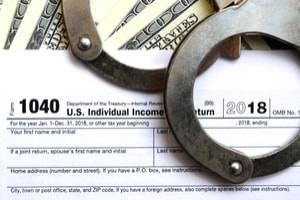What is an Abusive Tax Scheme?
 Every person must pay taxes. No matter one’s job, income level, or the amount of assets owned, most people are unhappy with the amount that the government takes. But while there are many ways to legally minimize the amount of taxes a person is obligated to pay, some people take additional, illegal steps to evade paying taxes.
Every person must pay taxes. No matter one’s job, income level, or the amount of assets owned, most people are unhappy with the amount that the government takes. But while there are many ways to legally minimize the amount of taxes a person is obligated to pay, some people take additional, illegal steps to evade paying taxes.
Tax fraud is a crime that can result in serious consequences; however, many people also fall prey to tax scams that promise to substantially reduce or completely eliminate the taxes a person must pay. In order to avoid criminal prosecution for tax evasion, it is important to recognize and avoid these abusive tax schemes.
Types of Abusive Tax Schemes
The IRS defines an abusive tax scheme as a violation of the Internal Revenue Code that uses multiple flow-through entities to evade taxes. Common types of abusive tax schemes include the following:
-
Foreign trusts - A taxpayer may place assets in multiple layered trusts, thus making it appear as though he or she does not control his or her business assets, and then transfers the assets to a trust in a foreign “tax haven” country.
-
International Business Corporations (IBCs) - After establishing an IBC in a foreign country, a taxpayer may send income to a foreign bank account, processing the income in a manner that allows him or her to avoid reporting this income to the IRS.
-
False billing - A taxpayer may send income to a foreign entity, claiming that he or she is making payments for goods or services that were purchased. However, he or she actually deposits these payments into a foreign bank account while claiming the payments as deductions for business expenses.
-
Micro-captive insurance shelters - A business may create a “captive” insurance company, allowing the business to claim deductions for insurance premiums. However, some taxpayers may use “micro-captive” schemes to cover implausible risks or use vague terms with the intent of sheltering funds from taxation.
-
Fraudulent return preparation - An accountant or other professional tax return preparer may encourage taxpayers to evade taxes by including false information on a return or improperly claiming tax credits, exemptions, or deductions.
People who use abusive tax schemes to evade taxes will be liable for the taxes owed, as well as any applicable interest. They may also face criminal prosecution, which can result in fines of up to $250,000 and five years in prison, as well as civil fraud penalties of up to 75 percent of the amount of taxes that were underpaid in addition to the taxes.
Contact a San Jose Tax Law Attorney
Taxpayers should be wary of any accountant or tax preparer who claims he or she can eliminate a person’s tax obligations or shelter his or her income or assets from being taxed.
If you have any questions about abusive tax schemes, or if you are being investigated by the IRS for tax evasion, John D. Teter Law Offices can provide you with the help you need. Contact a San Jose, CA tax attorney at 408-866-1810.
Sources:
https://www.irs.gov/compliance/criminal-investigation/abusive-tax-schemes-criminal-investigation-ci
https://www.irs.gov/compliance/criminal-investigation/what-are-some-of-the-most-common-abusive-tax-schemes
https://www.irs.gov/newsroom/irs-2018-dirty-dozen-tax-scams-abusive-tax-shelters-make-the-list









